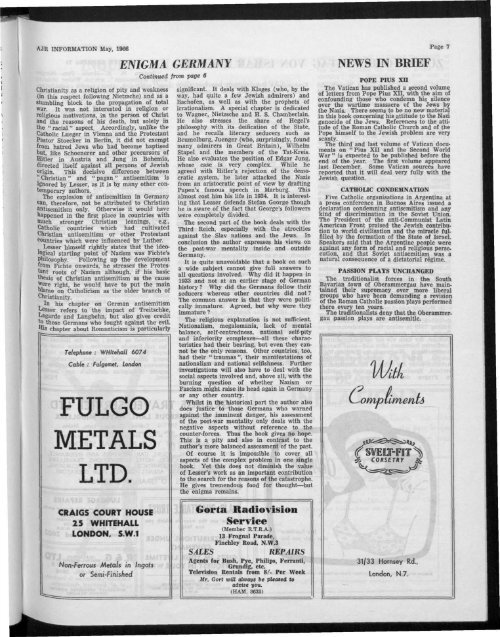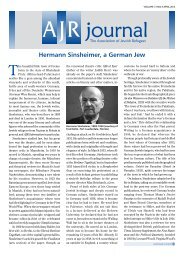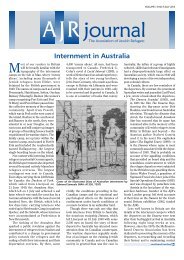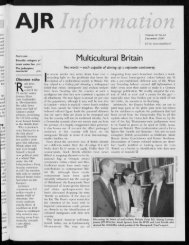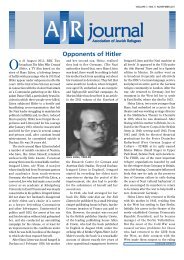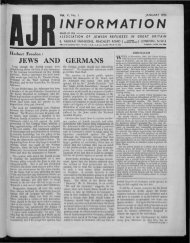Feuchtwanger (London) Ltd. - The Association of Jewish Refugees
Feuchtwanger (London) Ltd. - The Association of Jewish Refugees
Feuchtwanger (London) Ltd. - The Association of Jewish Refugees
You also want an ePaper? Increase the reach of your titles
YUMPU automatically turns print PDFs into web optimized ePapers that Google loves.
AJR INFORMATION May, 1966<br />
Christianity as a religion <strong>of</strong> pity and weakness<br />
(in this respect following Nietzsche) and as a<br />
stumbUng block to the propagation <strong>of</strong> total<br />
war. It was not interested in religion or<br />
reUgious motivations, in the person <strong>of</strong> Christ<br />
and the reasons <strong>of</strong> his death, but solely in<br />
the " racial" aspect. Accordingly, unlike the<br />
CathoUc Lueger in Vienna and the Protestant<br />
Pastor Stoecker in BerUn, it did not exempt<br />
from hatred Jews who had become baptised<br />
but, like Schoenerer and other precursors <strong>of</strong><br />
Hitler in Austria and Jung in Bohemia,<br />
directed itself against all persons <strong>of</strong> <strong>Jewish</strong><br />
origin. This decisive difference between<br />
'_' Christian" and " pagan" antisemitism is<br />
Ignored by Lesser, as it is by many other contemporary<br />
authors.<br />
<strong>The</strong> explosion <strong>of</strong> antisemitism in Germany<br />
can, therefore, not be attributed to Christian<br />
antisemitism only. Otherwise it would have<br />
happened in the first place in countries with<br />
niuch stronger Christian leanings, e.g..<br />
Catholic countries which had cultivated<br />
Christian antisemitism or other Protestant<br />
countries which were influenced by Luther.<br />
Lesser himself rightly states that the ideological<br />
starting point <strong>of</strong> Nazism was Fichte's<br />
Philosophy. Following up the development<br />
from Fichte onwards, he stresses the Protes-<br />
^nt roots <strong>of</strong> Nazism although, if his basic<br />
thesis <strong>of</strong> Christian antisemitism as the cause<br />
Were right, he would have to put the main<br />
blame on CathoUcism as the older branch <strong>of</strong><br />
Christianity.<br />
In his chapter on German antisemitism<br />
Lesser refers to the impact <strong>of</strong> Treitschke,<br />
Lagarde and Langbehn. but also gives credit<br />
^ those Germans who fought against the evil.<br />
His chapter about Romanticism is particularly<br />
Telephone : WHItehall 6074<br />
Cable : Fulgomet, <strong>London</strong><br />
FULGO<br />
METALS<br />
LTD,<br />
CRAIGS COURT HOUSE<br />
25 WHITEHALL<br />
LONDON, S.W.I<br />
Non-Ferrous Metals in Ingots<br />
or Semi-Finished<br />
ENIGMA GERMANY<br />
Continued from page 6<br />
significant. It deals with Klages (who, by the<br />
way, had quite a few <strong>Jewish</strong> admirers) and<br />
Bach<strong>of</strong>en, as well as with the prophets <strong>of</strong><br />
irrationalism. A special chapter is dedicated<br />
to Wagner, Nietzsche and H. S. Chamberlain.<br />
He also stresses the share <strong>of</strong> Hegel's<br />
philosophy with its deification <strong>of</strong> the State,<br />
and he recalls Uterary seducers such as<br />
Beumelburg, Juenger (who, surprisingly, found<br />
many admirers in Great Britain), Wilhelm<br />
Stapel and the members <strong>of</strong> the Tat-Kreis.<br />
He also evaluates the position <strong>of</strong> Edgar Jung,<br />
whose case is very complex. While he<br />
agreed with Hitler's rejection <strong>of</strong> the democratic<br />
system, he later attacked the Nazis<br />
from an aristocratic point <strong>of</strong> view by drafting<br />
Papen's famous speech in Marburg. This<br />
almost cost him his Ufe in 1934. It is interesting<br />
that Lesser defends Stefan George though<br />
he is aware <strong>of</strong> the fact that George's followers<br />
were completely divided.<br />
<strong>The</strong> second part <strong>of</strong> the book deals with the<br />
Third Reich, especially with the atrocities<br />
against the Slav nations and the Jews. In<br />
conclusion the author expresses his views on<br />
the post-war mentality inside and outside<br />
Germany.<br />
It is quite unavoidable that a book on such<br />
a wide subject cannot give full answers to<br />
all questions involved. Why did it happen in<br />
1933 and not at an earlier stage <strong>of</strong> German<br />
history ? Why did the Germans follow their<br />
seducers whereas other countries did not ?<br />
<strong>The</strong> common answer is that they were politically<br />
immature. Agreed, but why were they<br />
immature ?<br />
<strong>The</strong> religious explanation is not sufficient.<br />
NationaUsm, megalomania, lack <strong>of</strong> mental<br />
balance, self-centredness, national self-pity<br />
and inferiority complexes—all these characteristics<br />
had their bearing, but even they cannot<br />
be the only reasons. Other countries, too,<br />
had their " traumas ", their manifestations <strong>of</strong><br />
nationaUsm and national selfishness. Further<br />
investigations will also have to deal with the<br />
social aspects involved and, above all, with the<br />
burning question <strong>of</strong> whether Nazism or<br />
Fascism might raise its head again in Germany<br />
or any other country.<br />
Whilst in the historical part the author also<br />
does justice to those Germans who warned<br />
against the imminent danger, his assessment<br />
<strong>of</strong> the post-war mentality only deals with the<br />
negative aspects without reference to the<br />
counter-forces. Thus the book gives no hope.<br />
This is a pity and also in contrast to the<br />
author's more balanced assessment <strong>of</strong> the past.<br />
Of course it is impossible to cover all<br />
aspects <strong>of</strong> the complex problem in one single<br />
book. Yet this does not diminish the value<br />
<strong>of</strong> Lesser's work as an important contribution<br />
to the search for the reasons <strong>of</strong> the catastrophe.<br />
He gives tremendous food for thought—but<br />
the enigma remains.<br />
Gorta Radiovision<br />
Service<br />
(Member R.T.R.A.)<br />
13 Frognal Parade,<br />
Finchley Road, N.W.S<br />
SALES REPAIRS<br />
Agents for Bush, Pye, Philips, Ferranti,<br />
Grundig, etc.<br />
Television Rentals from 8/- Per Week<br />
Mr. Gort will always be pleated to<br />
advise you.<br />
(HAM. 8635)<br />
NEWS IN BRIEF<br />
Page 7<br />
POPE PIUS xn<br />
<strong>The</strong> Vatican has pubUshed a second volume<br />
<strong>of</strong> letters from Pope Pius XII, with the aim <strong>of</strong><br />
confounding those who condemn his silence<br />
over the wartime massacre <strong>of</strong> the Jews by<br />
the Nazis. <strong>The</strong>re seems to be no new material<br />
in this book concerning his attitude to the Nazi<br />
genocide <strong>of</strong> the Jews. References to the attitude<br />
<strong>of</strong> the Roman Catholic Church and <strong>of</strong> the<br />
Pope himself to the <strong>Jewish</strong> problem are very<br />
scanty.<br />
<strong>The</strong> third and last volume <strong>of</strong> Vatican documents<br />
on "Pius XII and the Second World<br />
War" is expected to be published before the<br />
end <strong>of</strong> the year. <strong>The</strong> first volume appeared<br />
last December. Some Vatican sources have<br />
reported that it will deal very fully with the<br />
<strong>Jewish</strong> question.<br />
CATHOLIC CONDEMNATION<br />
Five CathoUc organisations in Argentina at<br />
a press conference in Buenos Aires issued a<br />
declaration condemning antisemitism and any<br />
kind <strong>of</strong> discrimination in the Soviet Union.<br />
<strong>The</strong> President <strong>of</strong> the anti-Communist Latin<br />
American Front praised the <strong>Jewish</strong> contribution<br />
to world civilisation and the miracle fulfilled<br />
by the formation <strong>of</strong> the State <strong>of</strong> Israel.<br />
Speakers said that the Argentine people were<br />
against any form <strong>of</strong> racial and religious persecution,<br />
and that Soviet antisemitism was a<br />
natural consequence <strong>of</strong> a dictatorial regime.<br />
PASSION PLAYS UNCHANGED<br />
<strong>The</strong> traditionahst forces in the South<br />
Bavarian town <strong>of</strong> Oberammergau have maintained<br />
their supremacy over more Uberal<br />
groups who have been demanding a revision<br />
<strong>of</strong> the Roman CathoUc passion plays performed<br />
there every ten years.<br />
<strong>The</strong> traditionaUsts deny that the Oberammer.<br />
gau passion plays are antisemitic.<br />
Willi<br />
31/33 Hornsey Rd.,<br />
<strong>London</strong>, N.7.


